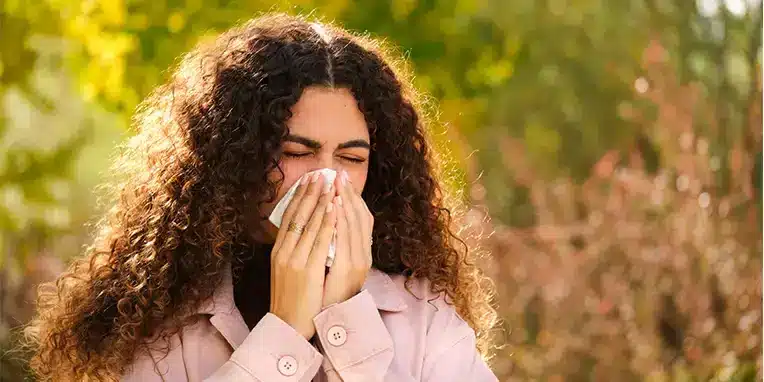
There’s no hiding from seasonal allergies – even when you live in Texas. Our warm and humid climate allows grass, weed, and tree pollen to trigger allergies year-round.
At Good Life Family Medicine in College Station, we understand how frustrating allergy flare-ups can be. In this guide, we’ll examine what causes Texas allergies and how you can manage them.
When is Texas allergy season?
Pollen allergens vary depending on the time of year. Knowing when specific pollens bloom can help you prevent flare-ups. Here are the most common allergens in each season:
Spring – March through May tend to be the worst months for those with tree pollen allergies. High levels of tree pollen, such as oak, mesquite, elm, and pecan cause allergic reactions.
Summer – June through mid-September, the most common Texas allergens are grass pollens, which produce large amounts of pollen that cause allergic reactions. In addition, the hot and humid Texas summer leads to the growth of mold spores, which is another common allergen.
Fall – From late September to mid-November, weed pollen is the leading cause of fall allergies. Ragweed produces large amounts of wind-blown pollen, which spreads across the great state of Texas.
Winter – From mid-December to mid-February, Texas experiences “mountain cedar season” when the cedar trees pollinate. Approximately a billion pollen grains travel hundreds of miles through the air on windy days.
This Houston Chronicle article explains How Texas Weather Makes Allergies Worse and includes a calendar of known allergens.
Common allergy symptoms
Airborne pollen from grass, trees, and weeds can trigger allergic reactions. Molds also thrive in our state’s warm and humid climate. If you’re a Texas resident or visitor and suffer from allergies, these are the symptoms you might experience:
- Sneezing
- Congestion
- Itchy, runny, or stuffy nose
- Coughing
- Headaches
- Itchy or watery eyes
- Scratchy throat
- Wheezing or shortness of breath
Allergy symptoms can impact your daily life and potentially increase the risk of other respiratory infections. Awareness of these symptoms allows for early intervention so you can minimize their severity and feel better.
How to alleviate allergy symptoms
- Check pollen levels – Watch local pollen forecasts and stay inside when the count is high.
- Maintain indoor air quality – Keep windows closed during peak pollen seasons to keep allergens out of your home.
- Flush your nasal passages – Use a saline rinse daily to wash away allergens and debris.
- Practice personal hygiene – Shower and wash your hair after being outside to remove allergens and pollen. Dust and vacuum often to remove allergens, dust, and pet dander.
- Avoid smoke – Smoking or being around smoke can make allergy symptoms worse.
- Use over-the-counter medications – Common allergy medications include antihistamines, which counter the body’s natural histamine reaction to allergens. Decongestants and nasal sprays also help relieve symptoms. Begin taking allergy medicine about two weeks before the onset of allergy season. Then, maintain a consistent dosing schedule for the rest of the season.
How Good Life Family Medicine Can Help
Are you struggling with seasonal allergies? At Good Life Family Medicine, we know how miserable they can be, and we’re here to help alleviate your allergy symptoms. Book an appointment online or call today, so we can help you feel better and enjoy the good life in Texas.
Read More: Good Life Family Medicine in College Station




